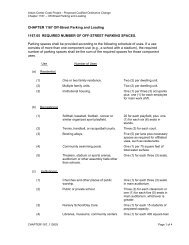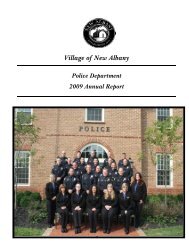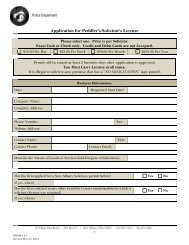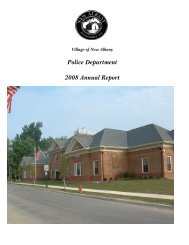NEW ALBANY POLICE DEPARTMENT - New Albany, Ohio
NEW ALBANY POLICE DEPARTMENT - New Albany, Ohio
NEW ALBANY POLICE DEPARTMENT - New Albany, Ohio
Create successful ePaper yourself
Turn your PDF publications into a flip-book with our unique Google optimized e-Paper software.
B. If the officer knows that a mandatory court appearance is required, the officer will mark<br />
the appropriate box on the citation and advise the violator. In those situations where the<br />
driving record is unavailable, a mandatory court appearance is required. The Clerk of<br />
Court’s office may waive the appearance once the driving record is available. A<br />
mandatory court appearance is required for a juvenile traffic offender (see Directive 2.1.2<br />
(B)).<br />
C. The reverse side of the violator’s copy of the citation contains the address for paying<br />
fines through the mail, entering guilty pleas, or contesting the citation. The Clerk of<br />
Court’s telephone number is provided on the citation and the fine schedule/court<br />
information envelope allowing the motorist to call for additional information.<br />
D. If the violator needs any other information or has questions, the officer will attempt to<br />
supply the necessary information or refer the violator to the proper source, but shall not<br />
discuss possible court outcomes and/or the amount of court imposed monetary fines.<br />
2.1.4 Uniform Enforcement Policies<br />
The aim of traffic law enforcement is to achieve voluntary compliance with traffic laws and<br />
regulations. To achieve this goal, the following policies and procedures will be followed:<br />
A. It is the policy of the Police Department to actively enforce the laws pertaining to<br />
driving under the influence of alcohol and/or drugs of abuse. Officers will arrest any<br />
driver found to be in violation of these laws.<br />
B. When an officer encounters a driver who is unable to produce a valid operator’s license,<br />
the officer will make an inquiry as to the status of the license through LEADS. If a driver<br />
is found to be driving under a suspension or revocation that requires a physical arrest (as<br />
outlined in Directive 2.1.1 (A), it is the policy of the Police Department to take<br />
enforcement action. In these cases, a transport to police headquarters is required and the<br />
necessary paperwork will be completed and bond posted, as applicable. All other DUS<br />
offenders (as outlined in Directive 2.1.1 (A) under “Summons in lieu of Physical Arrest”)<br />
may be released on a summons. An arrest report (U-10-100) will be completed on all<br />
DUS offenders placed under physical arrest.<br />
A DUS offender’s vehicle will be towed from the stop location unless a licensed driver is<br />
available or a supervisor approves not impounding the vehicle. The vehicle shall be<br />
impounded if owned by the offender and the vehicle is subject to forfeiture.<br />
C. The decision to warn or cite a violator will ultimately rely on an officer’s judgment<br />
based upon the conditions and circumstances at the time of the violation. However,<br />
officers should strictly enforce violations occurring in school zones and other areas of<br />
high pedestrian traffic.<br />
D. Hazardous violations are any violations of regulations affecting the use or protection of<br />
streets or highways enacted primarily to regulate safe movement of vehicles and<br />
pedestrians. It is the policy of the Police Department to aggressively enforce violations<br />
that affect the safety of the motoring public.<br />
E. Officers will take appropriate action for observed violations related to illegal on-road<br />
use, registration violations, equipment violations, and licensing violations committed by<br />
operators of off-road vehicles.<br />
If the Police Department receives a complaint concerning off-road recreational use of a<br />
vehicle on private property, the property owner shall be contacted to determine if<br />
permission has been granted to the operator of such vehicle. If the owner cannot be<br />
contacted or permission has not been granted, charges may be filed. Additionally,<br />
officers may take enforcement action in cases of reckless operation, OVI, leaving the<br />
scene of an accident, or other criminal conduct.<br />
5















